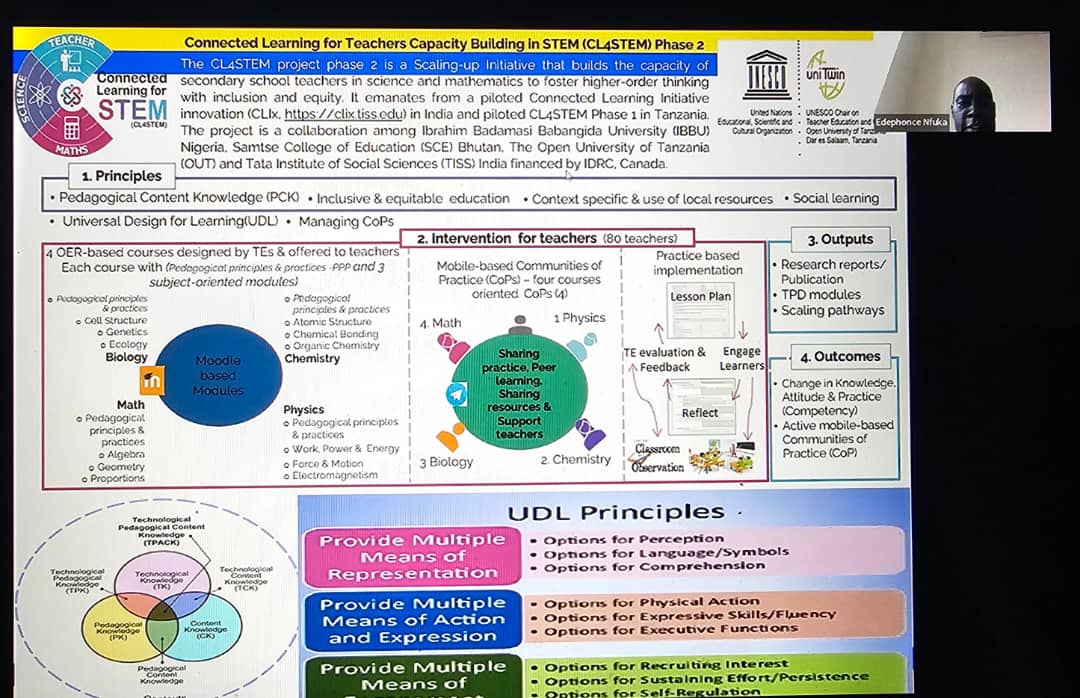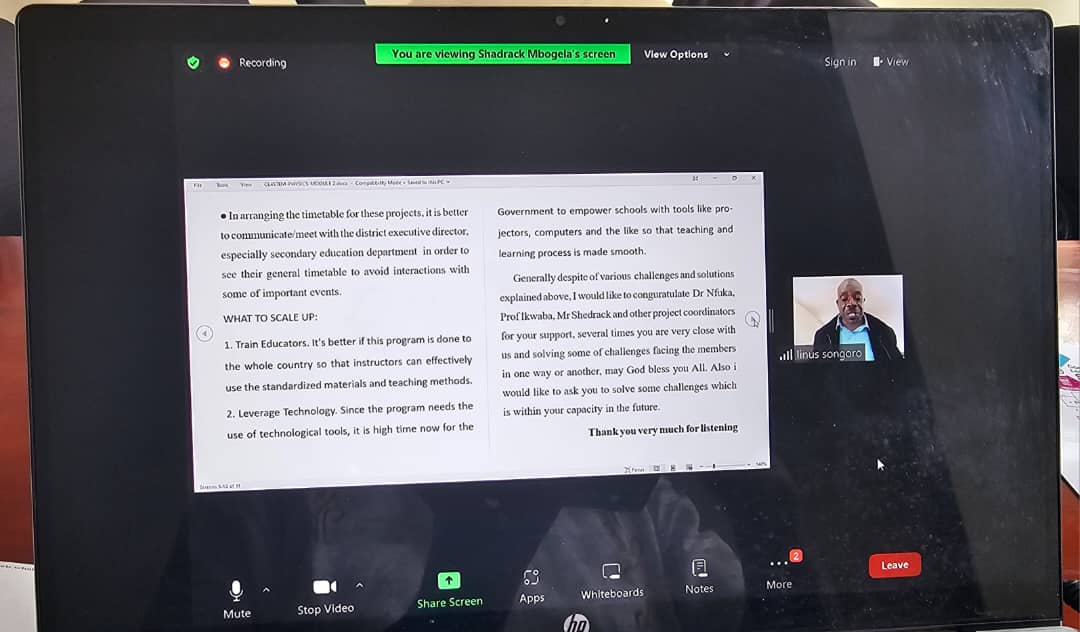DAR (August 5, 2024)-The Open University of Tanzania (OUT) conducted an online workshop on August 2, 2024, to reflect on the Connected Learning for Teachers Capacity Building in STEM (CL4STEM) initiative and explore ideas for scaling it up.


The workshop, held via Zoom, brought together teachers from 9 secondary schools in Iringa DC, respective school heads, local government officials, and OUT team members involved in the project.
Dr. Edephonce Nfuka, the project leader and Coordinator in OUT UNESCO Chair on Teacher Education and Curriculum Development, opened the session by welcoming participants and highlighting the goals, process and expected outcomes of CL4STEM Phase 2.
This phase focuses on scaling up initiatives that enhance the capacity of secondary school teachers in science and mathematics to promote higher-order thinking, inclusion, and equity.
The project is a collaborative effort between OUT and partners in Nigeria, Bhutan, and India, funded by the International Development Research Centre (IDRC) under the Global Partnership for Education's Knowledge and Innovation Exchange (GPE KIX).
In his remarks on the opening session, Mr Ohad Nosa, Headmaster of Mgama Secondary School and representative of the heads of schools, praised the progress made so far.
He highlighted the project's positive impact on teaching practices, noting that teachers are now utilizing diverse instructional strategies, including the effective use of local resources and technology.
He expressed his commitment to supporting the project's scaling efforts across schools and regions.
Dr. Hassan Mateka, representing OUT Teacher Educators, presented an overview of the project’s progress and stressed the importance of continuous reflection and adherence to pedagogical principles covered within the CL4STEM project as teachers prepare for the final Module 3.
He emphasized that while over 95% of participants have completed their activities on time, attention must be given to details while studying, doing activities and attempting assessment for maximizing the project's impact.
Subject-wise presentations on Physics, Chemistry, Biology, and Mathematics followed, where teachers shared insights from Module 2.
They discussed challenges such as aligning the CL4STEM schedule with school calendars, managing large class sizes, and addressing the scarcity of teaching devices.
Presenters expressed gratitude to the project leaders, partners, and funders for their support, highlighting the adoption of multiple teaching strategies, including the use of local resources, ensuring inclusive strategies in the classroom and applying digital tools like mobile phones, tablets, and laptops to enhance the learning experience.
Ms. Lydia Kayanda, a biology teacher, emphasized the increased use of technology-supported teaching methods.
She noted that mobile devices have become integral to classroom instruction, making teaching more engaging and interactive.
She also indicated that there is an increase in the use of online learning platforms and video conferencing tools in their capacity building within CL4STEM and beyond.
Teachers also advocated for the scaling up of CL4STEM practices not just regionally but nationally, urging the government to equip schools with the necessary resources, such as projectors and computers.
They also called for more professional development workshops to expose teachers to innovative teaching strategies and promote collaboration through communities of practice (CoP).
Addressing some of the challenges raised, research fellow Medard Rembesha reiterated that large class sizes are directly addressed in the CL4STEM objectives.
He encouraged teachers to engage with the Common Pedagogical Principles and Practice module to enhance classroom management strategies.
Dr. Rweyendera Ngonge also echoed it by highlighting the importance of fostering learner interactions of all types including among learners themselves and with content and instructors were deemed necessary to overcome the challenges of large classrooms.
The workshop concluded with remarks from the District Education Officer dealing with academics Ms. Tina Sanga, who commended the use of local materials and other strategies discussed.
 She thanked the teachers for their engagement and reaffirmed her support for the project’s goals while thanking OUT, its partners and funder for their immense support of the project. Ms Sanga also emphasized the need to align project activities with school calendars to ensure the continued success of remaining CL4STEM project activities and STEM education in general.
She thanked the teachers for their engagement and reaffirmed her support for the project’s goals while thanking OUT, its partners and funder for their immense support of the project. Ms Sanga also emphasized the need to align project activities with school calendars to ensure the continued success of remaining CL4STEM project activities and STEM education in general.














